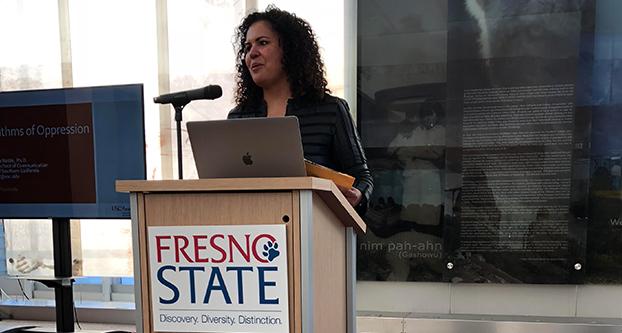Fresno State alumna Safiya Umoja Noble visited campus last Friday to talk about how Google algorithms can be racially biased.
An algorithm is commonly defined as a process or a set of steps that can be followed to achieve a certain result. In the case of Google, a search using certain terms can give the user a certain list of results.
Noble is a professor at the University of Southern California and the author of the book “Algorithms of Oppression: How Search Engines Reinforce Racism.”
As a Fresno State student, Noble was involved in Associated Students, Inc. (ASI) and the California Statewide Student Association (CSSA). Through her involvement, she advocated for making higher education more accessible to students of diverse backgrounds.
“We worked heavily on keeping student fees low [and] on increasing financial aid from the state and federal levels,” Noble said. “Which was a huge access issue for students of color and for working-class and poor students.”
In her talk, Noble reviewed an array of examples of Google’s racial biases.
One example she discussed was when it was found that Google search results for “professional hairstyles for work” were predominantly photos of white women, whereas search results for “unprofessional hairstyles for work” were predominantly photos of black women.
“This is how dominant narratives in society become normalized,” she said.
Noble also discussed that the Google search results for “black girls” include more pornographic content than other types of women. She said that stereotyping people of color is a real issue even today.
“These are not new narratives,” she told the audience.
Noble also discussed the incident involving Dylann Roof, a man who was sentenced to death for committing a mass shooting in a historical black church in 2015.
In Roof’s manifesto, he stated that he discovered the “Council of Conservative Citizens” – a white supremacy organization.
Noble noted that the name of the organization does not explicitly reference white supremacy. For this reason, even if a search using keywords that don’t relate to white supremacy are used — it can still be included in Google search results, she said.
Noble said as a college professor, she sometimes hears students say that they are heavily dependent on Google for completing school work, such as research papers. But although Google can provide users with a large amount of information, Noble doesn’t think it’s the best method for research.
“Google is not really designed to amplify knowledge,” she said. “It’s designed to amplify its advertisers’ content.”
Dave Tyckoson, a Fresno State research services librarian, said that although he feels that there are some merits to Google, the talk helped him further consider the search engine’s flaws.
“Google is the best information — finding tool in human history,” he said. “Yet she’s pointed out a number of issues that —because Google is so omnipresent, — it doesn’t bring out the information as equally as we all think it does.”
Noble ended her talk with a quote from her book: “We have more data and technology than ever, and more social, political and economic inequality to go with it.”




